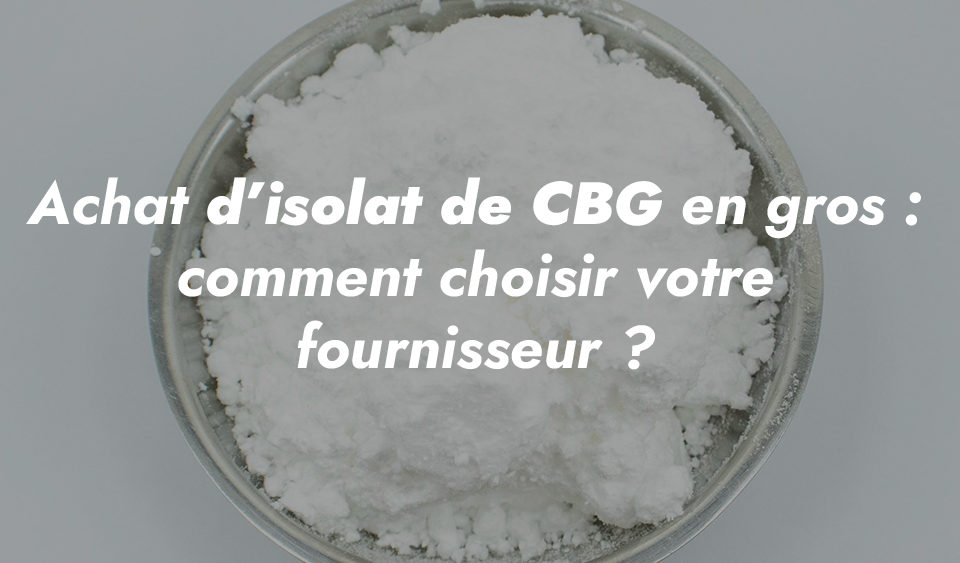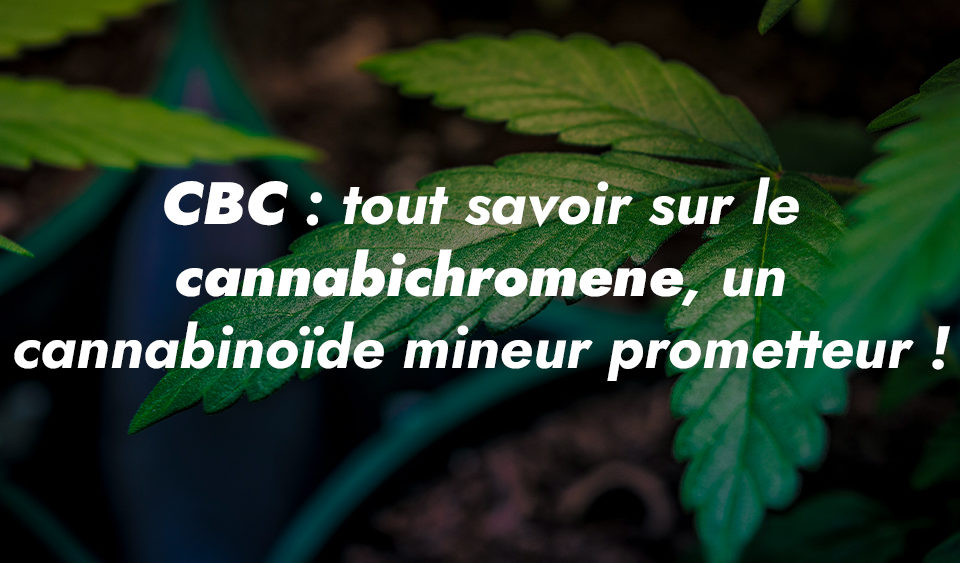
CBG isolate [Guide]: to be read before buying in bulk!
November 28, 2024CBN isolate, or cannabinol, has become a key element in the cannabinoid industry, particularly for professionals seeking to develop targeted, innovative products.
Over 98% pure, this hemp extract is prized for its unique applications, particularly in the wellness, relaxation and cosmetics sectors. However, before considering a wholesale purchase of CBN isolate, it's essential to understand its characteristics, benefits and points to evaluate when choosing a reliable supplier.
In this guide, we explain everything you need to know about CBN isolate: what is it? Why use it? And how to choose the right supplier? Whether you're a manufacturer or a distributor, this article will provide you with the keys to a successful investment.
What is CBN?
CBN (cannabinol) is a minor cannabinoid discovered in the early 20th century by the famous scientist Raphaël Mechoulam, and identified as one of the first isolated cannabinoids.
Although naturally present in low concentrations in hemp plants, CBN is attracting growing interest due to its therapeutic potential and its ability to complement the action of other cannabinoids in targeted formulations.
CBN biosynthesis
Unlike CBD, CBN is not synthesized from the mother cannabinoid, cannabigerol (CBG).
In fact, it is produced following a degradation process of THCa (tetrahydrocannabinolic acid), the non-psychoactive precursor of THC. This process is activated by environmental factors such as UV light, heat or prolonged exposure to oxygen. Under the influence of these elements, THCa gradually breaks down to form CBNa (cannabinolic acid), which is the acidic, inactive form of CBN.
Once CBNa has been formed, it undergoes a process of decarboxylation, a heat-induced chemical reaction that removes a carboxyl group (CO₂) to produce active CBN. This transformation is crucial, as it is in this active form that CBN exerts its potential effects in finished products.
This degradation process explains why natural CBN concentrations in hemp are generally very low, as most THCa is converted to THC before specific conditions allow its conversion to CBNa.
To produce CBN isolate in commercial quantities, advanced techniques are required. Targeted extraction, often followed by distillation or chromatography, is used to isolate and concentrate CBN. On the other hand, chemical synthesis is sometimes used to convert THC or other cannabinoids into CBN, meeting the growing demand for this rare and valuable extract.
Potential therapeutic properties
CBN is being studied for its many promising therapeutic properties. Although research is still in progress, several interesting applications have already been identified:
Relaxing and sleep-inducing: CBN is often associated with soothing effects, making it an ideal choice for products targeting insomnia or stress. Some studies have in fact shown a powerful sedative effect.
-Anti-inflammatory properties: CBN may play a role in managing inflammation, useful for chronic conditions.
-Neuroprotective effect: Studies suggest that CBN may help protect nerve cells and improve neurological health.
-Support for bone health: CBN has a potential role in stimulating bone growth, according to some preliminary research.
Like all cannabinoids, CBN also contributes to the entourage effect, reinforcing the efficacy of other hemp compounds in broad- or full-spectrum formulations.
How is CBN isolate manufactured?
Hemp isolate is a pure extract containing only one molecule. This guide focuses only on CBN isolate, but as you probably know, it's also possible to make CBG isolate or CBD isolate.
Green Exchange is a supplier of hemp insulation. So you'll find a wide range of insulates in our catalog.
But let's get back to the manufacturing process. CBN isolate is obtained from a rigorous extraction and purification process, the main stages of which are described below:
- Selection of raw material: Hemp plants rich in THCa or CBNa are used to maximize yield.
- Controlled THCa degradation: THCa is degraded by specific processes to produce CBNa, which is then decarboxylated to obtain active CBN.
- Initial extraction: plant biomass is subjected to extraction by supercritical CO₂ or solvents, producing a crude extract containing a mixture of compounds.
- Distillation and purification: The extract is refined through distillation and chromatography processes, eliminating impurities and unwanted compounds.
- Testing and packaging: The final product is laboratory tested to guarantee maximum purity and regulatory compliance.
As you can see, CBN isolate is a highly refined product , the production of which involves the use of several chemical inputs. To guarantee its purity, as well as the absence of any residual product, all our isolates are tested by an independent laboratory. We systematically provide our customers with an analysis of these results.
Key characteristics of CBN isolate
| Aspect | In pure crystalline form, generally presented as a fine, light, white or slightly translucent powder. |
|---|---|
| Texture | Dry and airy, its appearance is reminiscent of powdered sugar or very fine flour, making it easy to use and incorporate into a variety of formulations. |
| Composition | With a CBN purity of over 98%, it contains no other molecules derived from hemp, such as CBD or THC. |
| Taste and smell | Insipid and odorless, as it contains no terpenes. |
In short, CBN isolate does not alter the organoleptic characteristics of the base product to which it is added. Which explains why it is so sought-after by manufacturers of hemp-derived products.
Commercial applications: what can CBN isolate be used for?
Thanks to its exceptional purity and neutral taste and odour profile, CBN isolate has become an ingredient of choice for a number of fast-growing sectors. Indeed, its versatility means it can be incorporated into a wide range of products, meeting the needs of different markets.
1. Food supplements: CBN isolate is particularly appreciated for capsules, oils and powders designed to promote sleep, reduce stress or induce deep relaxation. Thanks to its purity, it enables precise dosage and guarantees optimum efficacy for consumers.
2. Cosmetics: In creams, serums and lotions, CBN is used for its soothing properties. In fact, it helps reduce redness and irritation, while promoting cell regeneration, making it a sought-after ingredient in products for sensitive or mature skin.
3. Food and beverages: Its solubility and lack of taste make it an ideal candidate for enriching functional products, such as teas, infusions or relaxing drinks.
This makes CBN isolate a key ingredient for innovative formulations and products tailored to the specific needs of each consumer.
CBN isolate: benefits vs. considerations!
CBN isolate is prized for its exceptional purity, generally over 98%, and its neutral taste and smell.
These features make it an ideal choice for formulations requiring absolute precision and compatibility with various types of products, such as dietary supplements, cosmetics and pharmaceuticals.
However, the absence of complementary compounds such as terpenes or minor cannabinoids means that CBN isolate does not benefit from theentourage effect. This is the theory that cannabis molecules act synergistically. This limits its suitability for applications where this effect is required. Especially as full and broad spectrum products are increasingly in demand.
What's more, the CBN isolate manufacturing process is particularly technical and requires advanced expertise, including complex purification and chromatography steps. Final quality is therefore highly dependent on the supplier's experience and infrastructure.
Finally, the production cost of isolate is generally higher than that of less purified extracts, such as distillate or crude. This cost difference can impact your margins and commercial positioning, especially if you're targeting price-sensitive market segments. So it's crucial to weigh up these aspects carefully before choosing the CBN isolate for your products.
CBN isolate or distillate?
As we've just seen, the main drawback of CBN isolate is that it doesn't take advantage of the entourage effect. Fortunately, the world of hemp extracts is vast! CBN distillate, for example, offers a generous concentration of CBN while preserving the various components of the flowers.
The choice between CBN isolate and distillate depends on your specific objectives and the properties you are looking for in your formulations.
As we have seen, CBN isolate is the ingredient of choice for applications requiring absolute precision, such as pharmaceuticals, cosmetics or dietary supplements.
CBN distillate, on the other hand, is a less refined extract, but richer in natural components. It generally contains between 60% and 80% CBN, along with other minor cannabinoids and terpenes, and even tiny traces of THC.
This complex blend offers an entourage effect sought after in many formulations dedicated to well-being, such as broad-spectrum oils. It is ideal for products aiming for a more natural, synergistic approach.
In conclusion, CBN isolate is ideal for formulations requiring purity and uniformity, while CBN distillate is ideal for products whose benefits are amplified by a more complete composition.
The final choice will depend on your technical and commercial priorities.
Should you have any questions or require personalized advice, our team is at your disposal to help you choose the right raw material for your projects.
Acheter de l’isolat de CBN : 5 étapes pour réussir votre achat
Acquérir de l’isolat de CBN est une décision stratégique pour les entreprises spécialisées dans le chanvre et les cannabinoïdes. Afin de garantir la qualité de vos produits et d’optimiser vos investissements, voici cinq points essentiels à considérer.
1. assess quality and analysis guarantees. Ensure that the CBN isolate is at least 98% pure and free of THC, terpenes or contaminants. Demand certified laboratory analysis, carried out by independent organizations, to validate compliance with regulatory standards.
2.choose a partner you can trust. Choose a supplier offering complete traceability, from hemp cultivation to the final product. Check guarantees concerning the extraction methods used and the origin of raw materials.
3. choose a local manufacturer. Working with a manufacturer based in France or Europe makes it easier to comply with local regulations, while reducing lead times and the ecological impact of transport.
4.choose a versatile supplier. Working with a company that offers other extracts, such as CBD and CBG distillates or isolates, can simplify your sourcing and broaden your formulation possibilities.
5) Negotiate purchasing and logistics conditions. Bulk orders often require large volumes. Discuss packaging options (airtight packaging, optimal shelf life) and make sure delivery times meet your needs.
Green Exchange has been supporting professionals in the cannabinoid sector for many years. Rely on our expertise to ensure the success of your CBN isolate wholesale project.





